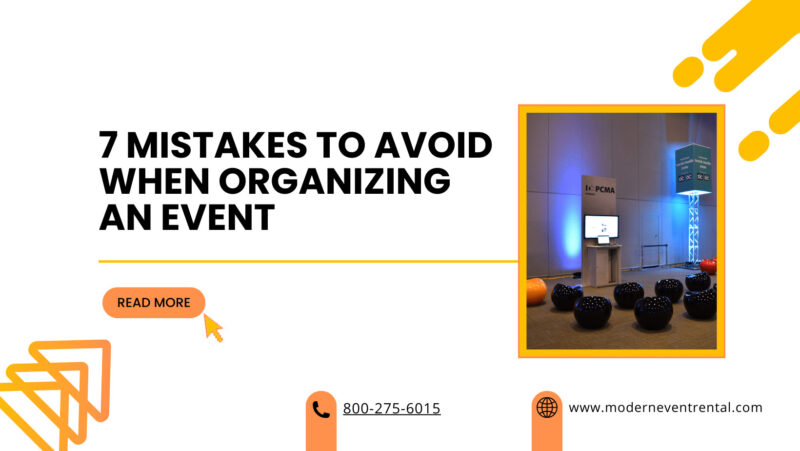7 Mistakes to Avoid When Organizing an Event

Event planning is a process that needs the utmost attention to detail. Irrespective of the type or size, all events need meticulous organization skills, including an eye for possible derailment and management.
Despite the best-laid plans, there are bound to be certain miscalculations and issues, including cost overruns, scheduling mistakes, and the like.

As a veteran supplier of event rentals in Chicago, we have come across many an event manager trying to salvage the situation, and managing the surprise challenges on the day of execution.
To prevent a last-minute scramble to save an event, it is best to follow Murphy’s Law – “If anything can go wrong, it probably will”
That is to say, as an event organizer, you need to do everything you can, to set yourself up for success, by anticipating all possible challenges, and being prepared for them.
That said, here are 7 common mistakes to avoid in event planning.
Not performing detailed budgeting
A successful event inevitably starts with a foolproof budget. And that includes detailed analysis and allocation of financial resources considering every single element of the event. Most event organizers prepare a general budget with a breakdown of the core elements. That may not suffice as you need to account for all possible things that cost money, including contingencies, transportation costs before the event, cost of miscellaneous items like printing, gifts, housekeeping, etc. Not accounting for the smaller elements can easily lead your budget to spiral out of control, as even the smallest expenses add up to big amounts taking up chunks of money off of the categories you budgeted for. The result will be a budget that is far from the real costs, and undue losses.
The bigger categories of expenses too like furniture, and decor need to be budgeted for as accurately as possible, considering the expected number of guests. Most suppliers of event rentals in Chicago do not entertain last-minute changes, which is why you need to be prepared.
Ignoring other events closer to the date and venue
When finalizing the date and booking the venue, it is important to make sure that no other events are happening nearby, that may end up competing with your event. You want to ensure the best chances for people to attend your event, and for this, you need to avoid competition. Hence, check nearby venues, or other venues in the same building, for events that can cause a poor turnout for yours. Check the dates as well, especially for events that entertain a similar audience category, so that prospective attendees remain available and free to attend your event.

Improper guest list management
When preparing the guest list, it is always a good idea to account for a higher number, lest you end up not being able to accommodate extra guests. Every attendee at your event should be treated like a VIP, which is why, every element you provide for your guests, including the food, the furniture, the gifts, the drinks, and everything else, must be equally and sufficiently provided for all. An inability to meet your guests’ requirements can reflect poorly on your event and your brand as a whole. And even a single bad experience can override all positive feedback.
Hence, make sure to prepare an accurate and reliable guest list, with sufficient resources allocated for extra people as well. When placing bookings for event rentals in Chicago, make sure to account for reasonable extra quantities.
Misallocation of resources
One of the primary duties of an event organizer is to appropriately allocate different resources to different aspects of the event, and this includes delegation of tasks. Surprisingly enough, most organizers fail at this. Allocation of resources must be done with a clear and perfect idea of what your team is capable of, what their strengths and weaknesses are, and what each task entails. Every aspect of event management inevitably demands the right talent, failing which can lead to utter chaos and confusion. It is not enough to assign tasks to team members blindly; the tasks must match the skillsets of the team members. Similarly, non-human resources, like time, must also be allocated sufficiently for different tasks. Improper calculation and scheduling mistakes can lead to further chaos.
Not performing a thorough risk assessment
As mentioned earlier, it is crucial to anticipate and account for all possible issues at an event. Ample organizing experience can help you plan and mitigate unexpected issues to a certain extent. However, to make a failproof plan, you need to perform a thorough risk assessment early on in the planning process. It involves sitting with your team, brainstorming all possible scenarios that could go wrong, and determining feasible solutions within the time and budget to put things back on track. This is a very crucial step, especially for beginners in the field of event management.
Failing to track and update team members with changes
The planning process for an event has to start a few months early, especially for large-scale events. Over the course of time leading up to the big day, there can be many changes, in the itinerary, in the guest list, in the programs, and many others. It is important to make sure that all members of your team are up to speed on these changes, and that everyone is collaboratively working towards a common goal.
Moreover, as you go forward fulfilling the planning checklist, and the event takes shape, you must make sure that everyone is on the same page. This can avoid redundant duties, inappropriate allocation of time, and uncoordinated vain efforts.
Not having a system for event promotion
Last but not least, an important element that sometimes comes as an afterthought is the promotion of the event. Large events often have dedicated marketing teams to take care of the promotional aspects. However, for smaller events too, it is important to have a proper marketing strategy and plan in place to promote the event. Assign marketing experts to brainstorm unique ideas to market the event. And needless to say, allocate an appropriate amount of funds for marketing as well. After all, an exceptionally planned and executed event calls for maximum reach and engagement. It would be a shame to not get the word out in time, for a fun and well-planned event.
Top-notch events demand top-notch event furniture; rely on Modern Event Rentals, Chicago
Behind some of the best events you see in Chicago, are months’ worth of meticulous planning, budgeting, and creative brainstorming. It is indeed impossible to have a hassle-free event without due diligence and attention to detail. Instead of preparing a generic plan and winging the rest, put your effort into creating a detailed plan and see the results for yourself. Use this handy guide to make sure you are not making these 7 mistakes.
For all your event furniture and décor needs, get in touch with Modern Event Rentals, Chicago; your holistic supplier of top-quality resources. For more details visit our Facebook page.
Back To Blog